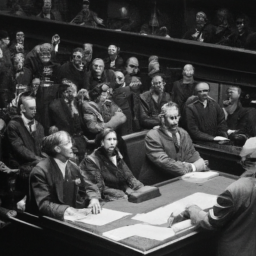The whip is a term used to describe the power of a political party to enforce discipline among its members of parliament. Members of a House are bound by the 'whip', and if any section of MLAs within a political party that is part of a ruling coalition says it, then the entire party has to vote along with the whip. The whip system is instrumental in maintaining party unity and ensuring that the party's agenda is carried out.
There are different types of whips in politics, each with its own set of responsibilities. The party whip is responsible for ensuring that all members of parliament vote in line with the party's official position on a particular issue. The chief whip, on the other hand, is responsible for managing the party's parliamentary business, including organizing votes and debates.
The whip system plays a crucial role in the functioning of the House of Commons and the House of Lords. It ensures that the government can pass its legislative agenda with the support of its party members. However, the whip system has also been criticized for stifling debate and preventing MPs from voting according to their conscience.
In recent years, the whip has been used as a form of punishment for MPs who fail to toe the party line. For example, former Cabinet minister Matt Hancock had the Tory whip suspended after it emerged he was entering the jungle for I'm A Celebrity… This decision was made to ensure party discipline and prevent any negative impact on the party's image.
Divisions within political parties can spell significant danger for the government. In 2015, Conservative whips demanded that all Conservative members vote against Labour's motion on fracking, despite it being a matter of conscience. This move was made to maintain party discipline and prevent any potential backlash from the public.
The whip system is not unique to the UK. In the US, party leaders use the whip to ensure that members of Congress vote in line with the party's position. This system is equally important in maintaining party discipline and ensuring that the party's legislative agenda is carried out.
The role of the whip has evolved over time. In the past, whips were responsible for ensuring that members of parliament attended parliamentary sessions and voted according to party lines. Today, the whip system is more complex and involves a range of responsibilities, including organizing debates and managing parliamentary business.
Former Health Secretary Matt Hancock has been stripped of the Tory whip after agreeing to go on reality TV show I'm A Celebrity. This decision was made to ensure party discipline and prevent any negative impact on the party's image.
In conclusion, the whip system is a crucial aspect of politics, ensuring that party discipline is maintained and the government's legislative agenda is carried out. However, it has also been criticized for stifling debate and preventing MPs from voting according to their conscience. The role of the whip has evolved over time, and it remains an important part of the political process.
